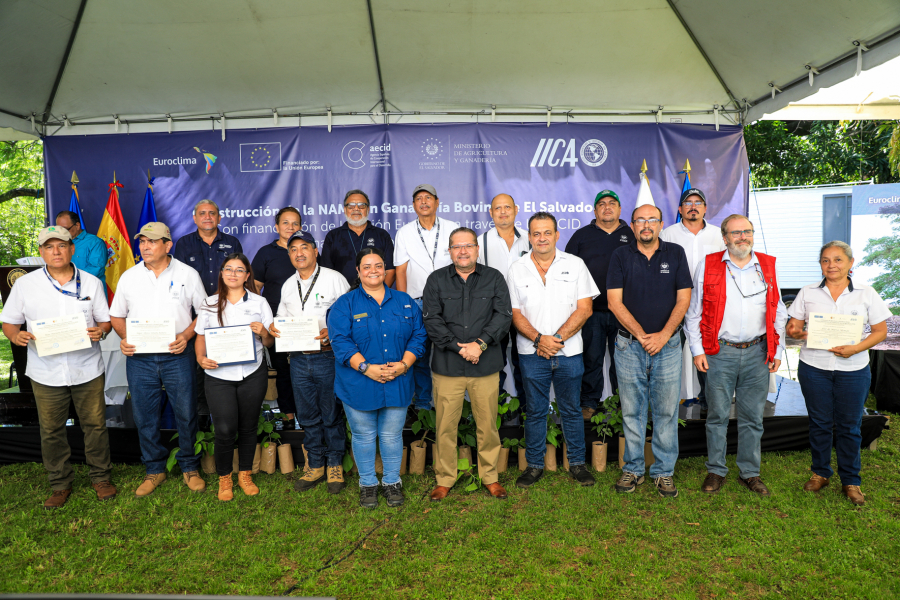"We are on the right path to develop livestock, especially because we are working under our Mejoramiento Genético Ganadero (MEGA), in addition to applying a restorative and resilient agriculture to ensure food sovereignty", said Minister Óscar Guardado.
The purpose of the NAMA project is to promote sustainable livestock farming with low greenhouse gas emissions, as well as to increase resilience to the effects of climate change, the efficiency of livestock production systems in relation to carbon and water, and food value chains.
The initiative is financed by the European Union, through the Agencia Española de Cooperación Internacional para el Desarrollo (AECID), under the EUROCLIMA+ program; it is also supported by the Instituto Interamericano de Cooperación para la Agricultura (IICA) and involves the Centro Nacional de Tecnología Agropecuaria y Forestal (CENTA), the Escuela Nacional de Agricultura (ENA) and the Instituto Salvadoreño de Transformación Agraria (ISTA).
"Our approach enables the fight against climate change, in addition to implementing national plans for the reduction of greenhouse gas emissions (...) We recognize that environmental heritage is an effective way for the productive fabric; work to which minister Guardado is also committed. We thank the IICA representative in El Salvador for all the support he is giving to the project", said the spanish Ambassador to El Salvador, Carlos de la Morena.
"We seek to strengthen the capacities and knowledge of livestock organizations and knowledge, and provide technical tools and exchange of experiences with countries in the region (...) We will generate ECAs workshops, with a focus on resilient livestock, where field practices are performed. Today we will graduate the participating producers and this month we will start with more technical assistance and training", said the IICA representative in El Salvador, Erick Quirós.
"Thanks to all the technicians from CENTA, ISTA and IICA for all the support they give us and what they will contribute to improve our livestock", said Ramiro Salazar, a producer representing the ASTORIA cooperative.
According to Melvin Trujillo, head of the Animal Husbandry and Agrostology Division of MAG's Directorate General of Livestock, NAMA is an initiative of the Ministry to improve cattle production and maintain a friendly relationship with the environment, and IICA is supporting its implementation.
According to Trujillo, as part of the NAMA project, five pilot farms are being established to implement seven measures:
Use of live fences
Shade trees and multipurpose trees - Silvopastoral systems
Planting and use of improved pastures
Creation of protein and energy banks
Rotation and rational use of pastures
Treatment and use of bovine manure
Use of probiotics in cattle feed
As part of the event, diplomas were awarded to 45 technicians for having completed the Training of Trainers Workshop in the Field Schools, focused on resilient and low-emission livestock farming.
Translated by: A.M
 English
English  Español
Español 

